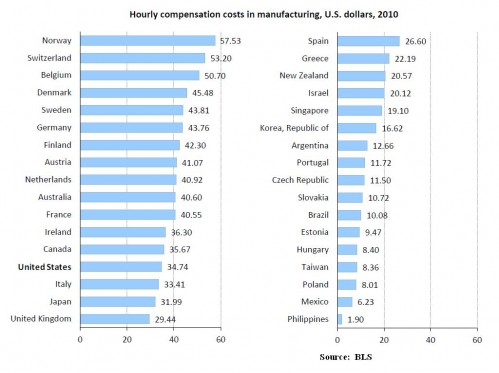Sorry if this disturbs anyone committed to the “decline/death of European social democracy” trope, but I think this chart (comparing hourly compensation for manufacturing workers in 34 countries) is most revealing.
As you can see, the USA ranks 14th and the UK ranks 17th. But what’s interesting are the 13 leading countries. Most of them are (to one degree or another) European social democracies; only one (Ireland) is in notably dire financial condition; and only two (Ireland and France) have unemployment rates higher than the USA or the UK. (Some of the data may be a little outdated, but I doubt by much.)
And one of these high-wage social democracies– Germany– is doing more than any other country to keep struggling European countries afloat.
So can we ditch the idea that higher wages for workers inevitably means weaker economies and fewer job opportunities?
In a post last June I quoted Jia Lynn Yang of The Washington Post:
Although U.S. policymakers say they’re running low on ammunition to jump-start the economy, the German government has been aggressively instituting policies aimed at protecting jobs — and they’ve worked.
The difference, say some experts, is that the German government has been unafraid to pursue policies that induce companies to preserve high-paying jobs and boost exports, embracing two words that can make lawmakers in Washington recoil: industrial policy.
In the United States, actively interfering in the affairs of big companies to save jobs is a line many politicians are unwilling to cross.
…..
Experts say Germany has been able to preserve its manufacturing sector partly because of the tight cooperation between government, industry and labor unions on the local and national levels.German executives also must work more closely with labor when they make decisions. By law, large companies must give half of their board seats to employee representatives.
Gary Herrigel, a professor of political science at the University of Chicago, says that in Germany, vocational schools also work closely with small and medium-size firms to figure out what kinds of training workers need. Students are trained in both the classroom and on the shop floors of employers.
Herrigel said German companies are also less focused on their share prices. “A key difference between the U.S. and Germany is the power of the financial sector is much more limited,” said Herrigel. “The circulation of funds for investments is much more driven by the strategies of business than the profit-making interests of financiers.”
Germany’s unemployment rate is 5.5 percent and falling, compared to the USA’s 8.6 percent. Alec MacGillis writes at The New Republic:
Seeking to capitalize on the European financial crisis, American conservatives have held up Germany as a paragon of austerity and free-market principle in contrast with its profligate and coddled Southern European neighbors. Overlooked in this framing, which mainstream coverage of the crisis has only abetted, is that German social democracy remains alive and well. Not only does the country still provide its citizens universal health insurance, but it kept unemployment low during the recession by subsidizing private employers to keep workers on at reduced hours rather than laying them off. If anything, today’s Germany is proof that a strong safety net and economic growth are fully compatible.
Derek Thompson of The Atlantic purports to find a silver lining of sorts for the USA. He writes:
On the one hand, the fact that U.S. manufacturing workers are seeing their salaries fall below the private sector… is good news. It makes them more competitive compared to workers in China and Taiwan. That could mean more U.S. jobs. As the gap closes between U.S. and foreign wages, more manufacturing jobs will stay here, especially when companies factor in the cost of shipping and logistics.
So the declining gap between the US and lower-wage countries may be reason for cheer? For some reason, a parody reggae song from the 1980s is playing in my mind. Unfortunately I can’t find it on YouTube, but the refrain goes: “Welcome to the Third World / Welcome to the rest of the world.”
At least Thompson offers an other hand:
[F]alling salaries aren’t so awesome for the workers whose wages aren’t keeping up with the rest of economy and find they can’t afford the rising cost of health care, higher education, and energy. What you’re left with is the inevitable pain of a necessary transition, which might as well be a new rubric for economic coverage. What’s good for employment — cheaper workers — isn’t necessarily better for the employed.
Um, yeah.
